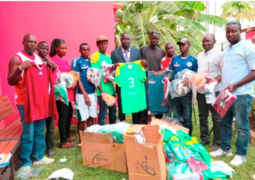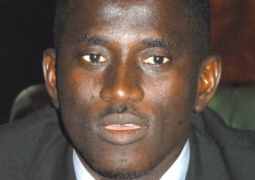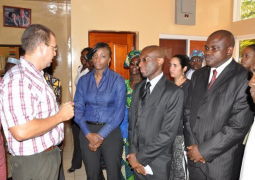The
It is in this light that the Commonwealth Secretariat, in collaboration with the United Nations Human Rights Council and the government of the Republic of Malawi, with funding from the Foreign and Commonwealth Office of the United Kingdom (UK), held a two-day training seminar from 29 - 30 September 2009 in Lilongwe, Malawi, to equip the Commonwealth member states with the modalities and procedures of the review exercise.
In her keynote address at the opening of the seminar, the Attorney-General of
As the UPR is still new for many UN member countries, the Commonwealth Secretariat has organised this training seminar to enable member countries share the experiences of those that had already reported in the initial rounds of the review process in 2008 and 2009, and thus become better prepared to participate in the UPR.
Each of the participating countries were represented by a state official (either from the Ministry of Justice or Foreign Affairs, depending on which state institution is designated to handle the UPR), a representative of the NGO sector and one from the country's national human rights commission, if it exists.
The UPR is a unique process which involves a review of the human rights records of all 192 UN Member States once every four years. 48 UN member countries are to be reviewed in sets of 16 countries in three UPR sessions in 2010. The
The UPR is a state-driven process under the auspices of the United Nations Human Rights Council, which provides the opportunity for each state to declare what actions they have undertaken to improve the human rights situation in their countries and to fulfil their human rights obligations. This review is done in the form of an interactive dialogue which takes place in
The report of this Working Group, which includes human rights recommendations that the countries under the review have agreed to, is then adopted by the Human Rights Council. However, NGOs and Civil Society have the opportunity to make their input in the process, both before and after the
A key component of a successful UPR process is the involvement of a civil society in dialogue and consultation before the preparation of the country report and the monitoring of the implementation of the recommendations that the concerned state agreed to.
General Assembly Resolution 60/251, which created the Human Rights Council on 15 March 2006, mandated the Council to "undertake a universal periodic review, based on objective and reliable information of the fulfilment by each state of its human rights obligations and commitments in a manner which ensures universality of coverage and equal treatment with respect to all states."
It further stated that the review shall be a cooperative mechanism, based on an interactive dialogue, with the full involvement of the country concerned and with considerations given to its capacity-building needs; that such a mechanism shall complement and not duplicate other treaty bodies.
Resolution 5/1 of the Human Rights Council allows an active engagement of NGOs in the UPR mechanism. It states that the UPR shall "ensure participation of all relevant stakeholders, including Non-Governmental Organisations and national human rights institutions in accordance with General Assembly Resolution 60/251 of 15 March 2006 and Economic and Social Council Resolution 1996/31 of July 1996, as well as any decisions that the Council may take in this regard."
In accordance with the Resolution, States are therefore encouraged to prepare the information (country report) they submit through a broad-based consultation at the national level with all relevant stakeholders.
The ultimate goal of the UPR is the improvement of the human rights situation in every country with significant consequences for people around the globe. It is designed to provide support and expand the promotion and protection if human rights on the ground.
In fact, a successful review is not one in which no criticisms are made. Every state has human rights challenges. The review is ultimately a success if it leads the country concerned to address those challenges in co-operation with other stakeholders, and improve people's lives.
Hence, the UPR is neither intended to be a self-congratulatory mechanism nor a naming and shaming event, it is to be viewed both as a mechanism and a process that is designed to encourage cooperation among states and stakeholders and facilitate the mainstreaming of human rights in all aspects of national life. It has the potential to pave the way for a conceptual shift from indifference in co-existence to co-operation.
The UPR, therefore, allows countries to take a critical look at their human rights situation, discuss challenges they face with peers (other countries), as well as national stakeholders and take the necessary steps towards improving human rights situation in their countries.
The participation of the government of The Gambia and a representative of non state actors has provided the country with the capacity to organise seminars and conduct consultation in order to make the review exercise a success in February 2010.
The author participated in the recently concluded training seminar on the United Nations Universal Periodic Review (UPR) on Human Rights, held in Lilongwe, Malawi, organised by the Commonwealth Secretariat, in collaboration with the United Nations Human Rights Council and the government of the Republic of Malawi, with funding from the UK Foreign and Commonwealth Office.




